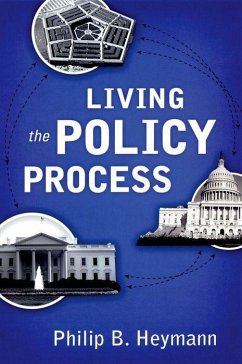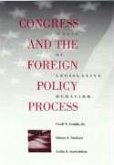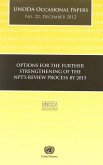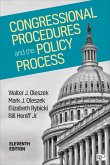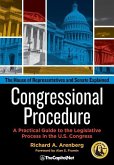Policymaking in large bureaucracies is hardly a simple process. Even the most respected policymakers have to contend with obstacles that seemingly have little to do with the issue at hand - office politics, work structure, and shifting political environments. Yet learning to manage such complex environments is necessary for good policymaking. In Living the Policy Process, Philip Heymann outlines the complex thought processes of policymakers as they struggle to influence both foreign and domestic policy decisions from within the United States government bureaucracy. Focusing on three critical situations to illuminate the politics of policy choice-the successful attempt to sell missiles to the Mujahideen in Afghanistan in the 1980s; the Iran-Contra scandal; and the FDA's attempt to regulate smoking as well as the efforts to do the same by an outside lobbyist-Heymann dissects the intuitive yet rigorous framework that highly skilled policymakers follow to influence government outcomes. Throughout, he offers detailed accounts of the policy process at work in the Reagan, first Bush, and Clinton administrations, from the cabinet level down to the middle tiers of the federal bureaucracy.Heymann deftly describes the shifting real-world conditions that government officials face as they struggle to shape the policy agenda. Ultimately, Living the Policy Process offers a clear, incisive look at the complex considerations involved from all perspectives, with concrete examples, and enriches the understanding of the overall policy process for students, scholars, and practitioners.
Focusing on three classic case studies, Philip B. Heymann draws on his fifteen years of federal policymaking experience to provide a unique, in-depth introduction to the world of public policy. Combined, the four paradigmatic examples in Living the Policy Process--the successful attempt to sell missiles to the Mujahideen in Afghanistan in the 1980s; the Iran-Contra scandal; the attempts by the FDA and then by an outside lobbyist to regulate smoking; and the flawed process by which the Bush Administration handled torture--provide leaders with a comprehensive overview of how the process occurs in the real world. Filled with detail and practical examples, Living the Policy Process is the perfect text for students, teachers, and practitioners of public policy.
Focusing on three classic case studies, Philip B. Heymann draws on his fifteen years of federal policymaking experience to provide a unique, in-depth introduction to the world of public policy. Combined, the four paradigmatic examples in Living the Policy Process--the successful attempt to sell missiles to the Mujahideen in Afghanistan in the 1980s; the Iran-Contra scandal; the attempts by the FDA and then by an outside lobbyist to regulate smoking; and the flawed process by which the Bush Administration handled torture--provide leaders with a comprehensive overview of how the process occurs in the real world. Filled with detail and practical examples, Living the Policy Process is the perfect text for students, teachers, and practitioners of public policy.

